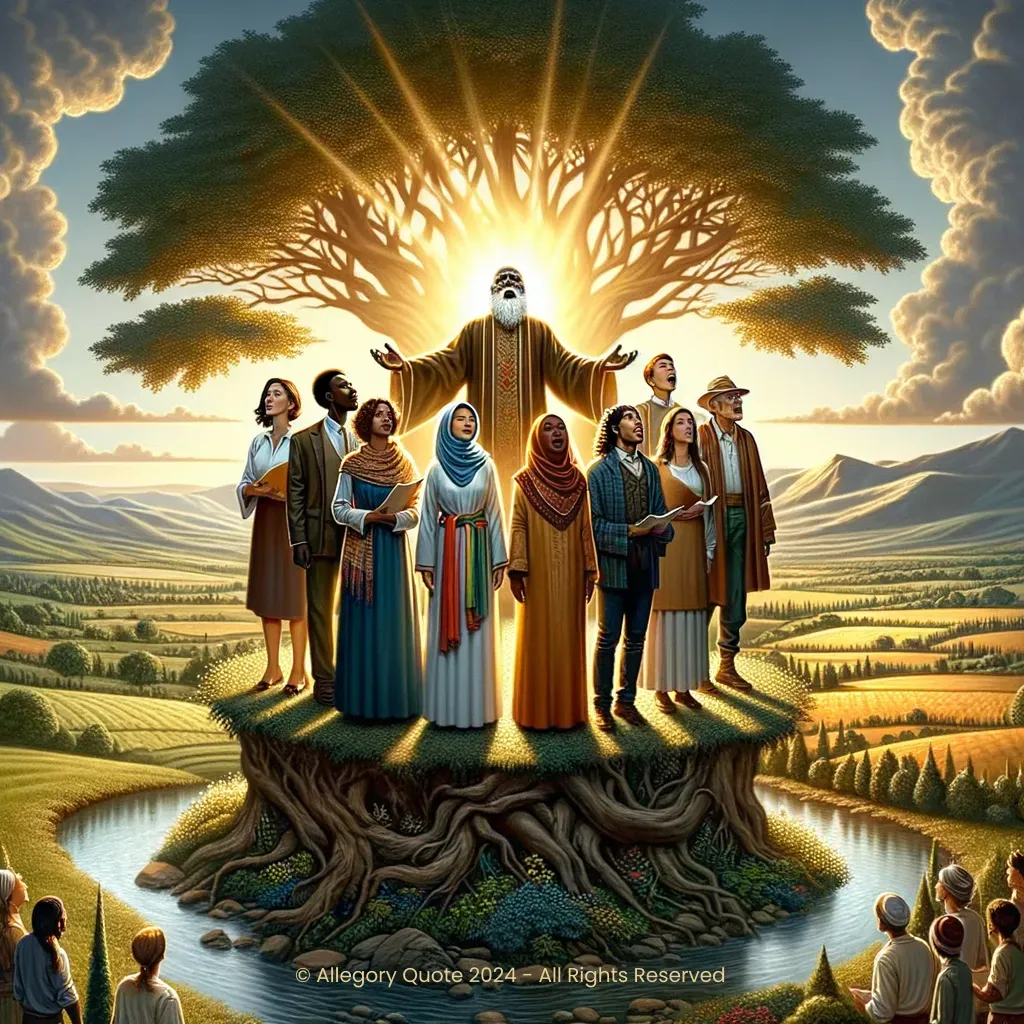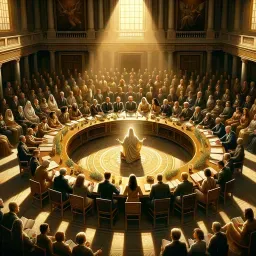Vox populi, vox Dei

0
0
0
0
- Meaning
- The phrase "Vox populi, vox Dei" suggests that the collective voice or opinion of the people holds significant authority and should be considered as if it carries divine weight. Philosophically and politically, it implies that the will or judgment of the masses can guide moral and righteous governance. However, Alcuin's use was somewhat cautionary, warning against assuming that popular opinion is always right or divinely inspired. This introduces a dynamic tension between democracy, populism, and wise governance.
- Allegory
- The group of diverse people represents the collective voice of society, showcasing the principle of inclusivity and the idea that every voice contributes to the whole. The harmonious symphony of their voices ascending towards the golden light signifies the concept that public opinion has a divine weight or moral authority. The tree with deep roots and expansive branches symbolizes both the historical foundations and future aspirations of governance led by public wisdom, bridging the past with the present and future. The mix of historical and modern elements in the setting suggests the enduring nature of the principle across ages, while the hopeful and determined expressions highlight the power and positive impact of collective action and decision-making.
- Applicability
- The teaching of this phrase can be applied in personal and societal contexts by acknowledging the importance of listening to public opinion and ensuring that leadership and decisions are made with consideration of the people's voices. It promotes the idea of democratic engagement and responsiveness in governance, while also suggesting the need for critical evaluation to avoid the pitfalls of populism. In kindling self-awareness, it encourages balance between valuing collective input and exercising individual discernment.
- Impact
- The phrase has had a considerable impact on Western political thought and has been referenced in discussions of democracy, public opinion, and governance. It has been used to advocate for the inclusion of public opinion in decision-making processes and to highlight the moral authority of the collective voice. It appears in various political, religious, and literary works, contributing to ongoing debates about the legitimacy and wisdom of popular rule versus oligarchic or autocratic governance.
- Historical Context
- Alcuin of York is credited with this phrase during the late 8th century, a time when he was a leading scholar at the court of Charlemagne. This period was marked by significant intellectual and cultural revival known as the Carolingian Renaissance. The context of its origin reflects the medieval struggle between theocratic and populist influences in governance.
- Criticisms
- Criticisms of the phrase often focus on the potential dangers of equating popular opinion with divine truth, as public sentiment can be fickle, misguided, or manipulated. Critics argue that this idea could lead to populism, wherein leaders might pander to the masses without critical evaluation or moral consideration. Philosophers and political analysts caution against uncritically accepting public opinion as inherently wise or morally correct.
- Variations
- Variations of this phrase appear in different cultural contexts where the voice of the people is equated with moral or divine authority. In ancient Greek philosophy, there were similar discussions about the role of the polis and the wisdom of the demos. Additionally, in some Islamic traditions, the Shura, consultative council, embodies the principle of considering communal opinion, emphasizing the correlation between collective decision-making and divine will in governance.
-

Vivere est militare.
-

The more the cat goes to the lard, the more likely it is to lose a paw.
-

Primus inter pares.
-

Vita est militia.
-

It is not in the stars to hold our destiny but in ourselves
-

I contend that the strongest of all governments is that which is most free.
No Comments